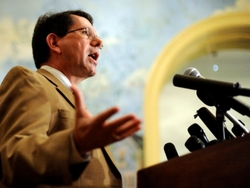Tea party leader: Denying vote to those without property 'makes a lot of sense'
 When critics charged that tea party groups like True the Vote may have been trying to disenfranchise voters with their aggressive tactics in the 2010 elections, the allegations were often waved off as a hysterical exaggeration.
When critics charged that tea party groups like True the Vote may have been trying to disenfranchise voters with their aggressive tactics in the 2010 elections, the allegations were often waved off as a hysterical exaggeration.
But at least some leaders of the national tea party movement openly question the idea of widely-accessible voting rights -- even embracing a time in U.S. history when suffrage was denied to renters and others who didn't own property.
On his November 17 internet radio program, Judson Philips -- president of the Nashville-based company Tea Party Nation -- defended the original U.S. laws that allowed only the landed elite to vote, making these comments:
The Founding Fathers originally said, they put certain restrictions on who gets the right to vote. It wasn't you were just a citizen and you got to vote. Some of the restrictions, you know, you obviously would not think about today. But one of those was you had to be a property owner. And that makes a lot of sense, because if you're a property owner you actually have a vested stake in the community. If you're not a property owner, you know, I'm sorry but property owners have a little bit more of a vested interest in the community than non-property owners.
Currently, one-third of U.S. residents do not own their homes and would presumably be denied the franchise under such a system.
But Phillips' discussion of changes to the U.S. Constitution didn't stop there. Also on the program was David DeGerolamo, a North Carolina tea party leader and founder of NC Freedom, a state-wide tea party umbrella group.
DeGerolamo went even further on the program, calling for complete repeal of the Fourteenth Amendment -- a broad-ranging amendment which outlines basic rights of citizenship, due process and equal protection.
Here's a transcript of the discussion between Philips and DeGerolamo:
Judson Phillips: "Of course, when people talk, three Amendments that really are the only ones that seriously get talked about getting repealed: the 16th Amendment, for the income tax, and we can only hope that happens; the 17th Amendment for having the appointment of Senators got back to state legislatures; and the 26th Amendment, I believe it is. Do you know which one that is, David?"
David DeGerolamo: "No, but I know which one I want repealed."
Judson Phillips: "Which one is that?"
David DeGerolamo: "I want the 14th Amendment repealed."
Judson Phillips: "At least modified, but yeah..."
Listen to the audio here.
Even Phillips appeared to be caught off-guard by DeGerolamo's statement, which goes beyond the demands of some Republicans to modify the 14th amendment's granting of so-called "birthright citizenship" to anyone born on U.S. soil.
But DeGerolamo's statement is in line with a far-right school of thought that opposes all "Reconstruction Amendments" -- those added to the U.S. Constitution after freed African-Americans were able to hold leadership roles in government after the Civil War.
As the Tea Party Nationalism website documents, DeGerolamo's group NC Freedom has previously promoted the idea that such laws are invalid:
NC Freedom publicized a series of seminars conducted by a group calling itself the North-Carolina American Republic. These workshops, entitled "Restore our Republics," promoted the notion that individuals can declare themselves citizens of the North-Carolina Republic--the "real government" that was taken away by the Reconstruction Acts after the Civil War.
In North Carolina, groups like Americans for Prosperity -- backed by conservative millionaire Art Pope -- have coordinated tea party events with DeGerolamo and NC Freedom.
Tags
Chris Kromm
Chris Kromm is executive director of the Institute for Southern Studies and publisher of the Institute's online magazine, Facing South.
